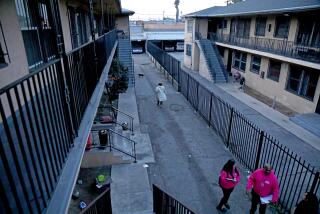Extra deposit for kids? That’s illegal
- Share via
Question: I have lived in an apartment complex with my three children for six years. The new resident manager sent all the tenants with children a notice stating that an additional security deposit would be required to cover any damage the children might do to the apartment or the outside property. What is a reasonable amount for me to pay?
Answer: You can never be required to pay an extra security deposit for children. Code 1950.5 defines the maximum security deposit amount that can be collected by landlords or their agents.
Regardless of a family’s composition, the civil code allows for a deposit of twice the monthly rent for an unfurnished unit and three times the monthly rent if the unit is furnished.
For a manager to ask for a deposit amount beyond the legal limit just because children are present may be a form of discrimination.
If you have a month-to-month agreement and have already paid the full amount of deposit allowed, the manager can’t request an additional payment. If you did not pay the full deposit amount when you moved in six years ago, then you can be asked for an additional amount up to the limit allowed for your unit -- furnished or unfurnished.
The additional increase up to the statutory limit, however, cannot be based on the fact that you have children. Such an increase would have to be based on uniform, nondiscriminatory criteria, applied to all tenants regardless of whether they have children.
If you are on a lease, the manager cannot request an additional amount during the term of the lease, even if you haven’t paid the full amount of security deposit allowed. Lease conditions, such as the amount of rent or deposit, can’t be changed during a lease period.
At the end of your tenancy, if your children have caused damage in excess of your original security deposit, the landlord may attempt to collect the excess amount in Small Claims Court.
*
Landlord firm on move-out date
Question: I had planned to move out of my apartment on the 15th of the month but was unable to find another place, so I sent the landlord a money order for the full month’s rent. My landlord immediately returned 15 days’ worth of rent saying I must still move by the 15th. I thought once the full rent was paid, a 30-day notice is canceled. What happened in my case?
Answer: Whether a rent payment cancels a notice to move depends on the circumstances and timing of the payment. In your situation, since the landlord did not want you to remain a tenant, he or she immediately returned the rent that exceeded your 30-day notice.
The operative word here is “immediately.” When refunding the extra rent, a landlord could also provide a note stating the acceptance of the full rent was not a waiver of the original 30-day notice and the tenant still was obligated to move. If the landlord kept the excessive rent amount for an extended time before returning it, then there could be an implied withdrawal of a 30-day notice.
Landlords are entitled to rent for the time a tenant occupies property. Since landlords have no control over how much a tenant decides to pay or the method of payment (i.e., check, money order), the mere act of receiving the rent may not automatically cancel a notice to move. If this were the case, after giving or receiving a notice to end a tenancy, landlords would never know when a tenant was moving. This could cause problems if the unit was re-rented and the landlord was not able to deliver the property to the new tenant.
The only time a landlord’s act of receiving rent cancels a notice is when a tenant pays past-due rent after being served a Three-Day Pay Rent or Quit Notice.
*
Questions may be sent to 1055 Sunnyvale-Saratoga Road, Suite 3, Sunnyvale, CA 94087 but cannot be answered individually. For housing discrimination questions, complaints or help, call the state Department of Fair Housing and Employment at (800) 233-3212 or the Southern California Housing Rights Center at (800) 477-5977.
More to Read
Sign up for Essential California
The most important California stories and recommendations in your inbox every morning.
You may occasionally receive promotional content from the Los Angeles Times.






